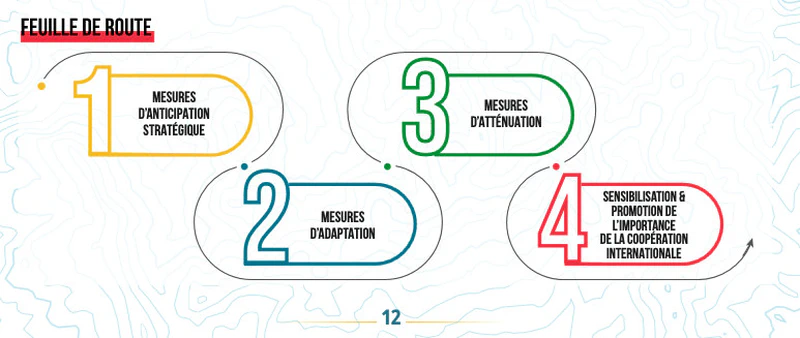I shouldn’t have been surprised that the military is already preparing for “what comes next.” And yet the striking phrase from the mouth of one of France’s highest-ranking officers (I’m no specialist) left an impression on me: “Have I done everything to be ready?”
The military…
Thierry Burkhard, Chief of Staff of the Armed Forces (2'03" clip retrieved from twitter, March-June 2023 (no precise date))1:
All leaders, each at their level: he must be talking about all French business leaders too, right? That must include them.
Following up, as an echo, Clément Isaia sends me a document [Climate change, what strategic issues for the armed forces]. March 2023.
One phrase again strikes me: “To better understand the impacts of climate change, strengthening knowledge and adaptive capacities is essential.” The document concludes with this reminder:

And our companies? Have they measured the importance of strengthening knowledge and adaptive capacities? Have they triggered anticipatory actions (assuming we’re not already there)?
Regarding the military, you also have this page: https://www.defense.gouv.fr/dereglement-climatique-quels-enjeux-armees.
And the banks…
Which are part of our companies. A surreal, mind-boggling report comes out on Deutsche Bank (a German bank that we’ll therefore associate with discipline, rigor, precision, but it’s a report made by Londoners apparently :) ). The report is titled “The age of disorder”, its objective is to prepare the ultra-wealthy for the world that the military describes above. It is covered and commented in French here.
In a few words, I’ll just take the main headings of the article for those in a hurry:
- “An economic survival guide for the ultra-wealthy”,
- beware for them, of “aging and lack of docile and cheap labor”,
- of “the return of inflation will erode large estates”,
- the most chilling: “growth VS environment, the new cold war”,
- and finally: “strategy: populism to the rescue of the wealthy”.
And then there’s this talk that Sébastien Roccaserra recommends to me by Daniel Rushkoff (youtube link), this passage is stunning:
The report is crazy. The idea of these men using Rushkoff too. But. But. This indicates that banks, and the ultra-wealthy are preparing.
They are preparing.
And our companies?
Companies
The military, the banks—it’s no longer about the activists so decried in certain circles.
It’s time for our companies to move faster in this direction. We can well imagine that being avant-garde has a real cost. As before, despite the possibility of I don’t know what uberization of their business, companies seem reluctant even though the danger is there. The disruption linked to climate change, to the imbalance of planetary boundaries, is certain. If you don’t change, you’ll be the next Kodak (well too bad really, but we’ll be the next dinosaurs, that’s more troublesome).
- Do you have a strategic plan linked to a probable and near reversal of the phrase “growth VS environment” to “No growth without integration into the environment”?
- Have you identified new paths, new forms, of expression for your company compatible with a massively reduced carbon footprint for you and your clients or users?
- Have you observed and exploited the legal instruments that allow you investments and to offset losses?
- We know that CSRD compliance is fast approaching (and good thing too), are you ready?
- In case of a sudden incident (see Frugarilla’s scenarios) like the collapse of your datacenters or the impossibility of replacing your IT hardware (few are the companies for which one of the nerve centers isn’t IT), do you have a crisis exit plan? Have you even assessed the losses?
Anticipate, chart strategic paths, prepare for adaptation.
-
If anyone has a link to an official video (neither on twitter nor on youtube, etc.). If anyone really wants the original, I downloaded it (but I don’t want to put a 13mb video on my site, and I probably don’t have the right to offer it?). ↩︎